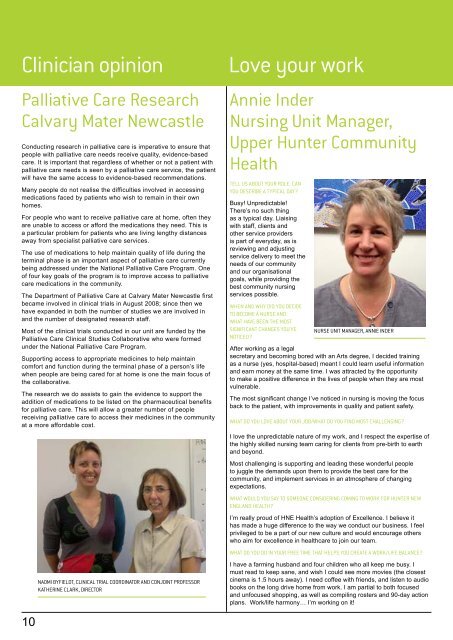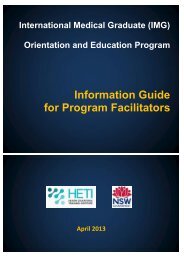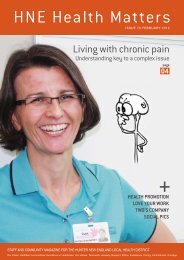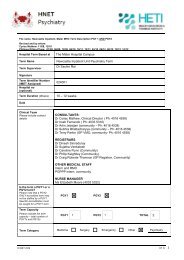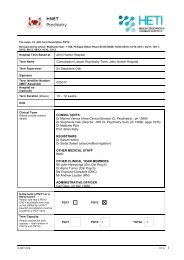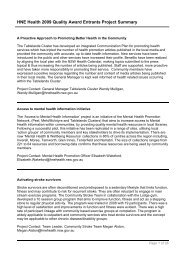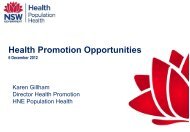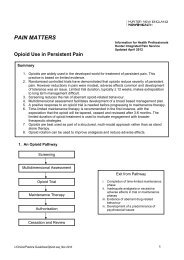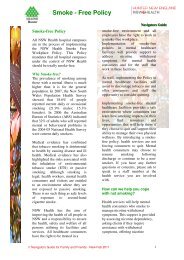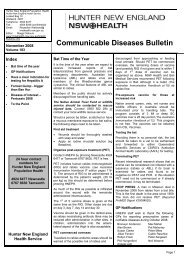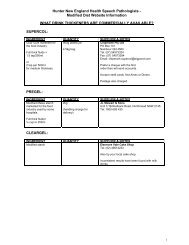March 2013 - Hunter New England Health - NSW Government
March 2013 - Hunter New England Health - NSW Government
March 2013 - Hunter New England Health - NSW Government
Create successful ePaper yourself
Turn your PDF publications into a flip-book with our unique Google optimized e-Paper software.
Clinician opinion<br />
Palliative Care Research<br />
Calvary Mater <strong>New</strong>castle<br />
Conducting research in palliative care is imperative to ensure that<br />
people with palliative care needs receive quality, evidence-based<br />
care. It is important that regardless of whether or not a patient with<br />
palliative care needs is seen by a palliative care service, the patient<br />
will have the same access to evidence-based recommendations.<br />
Many people do not realise the difficulties involved in accessing<br />
medications faced by patients who wish to remain in their own<br />
homes.<br />
For people who want to receive palliative care at home, often they<br />
are unable to access or afford the medications they need. This is<br />
a particular problem for patients who are living lengthy distances<br />
away from specialist palliative care services.<br />
The use of medications to help maintain quality of life during the<br />
terminal phase is an important aspect of palliative care currently<br />
being addressed under the National Palliative Care Program. One<br />
of four key goals of the program is to improve access to palliative<br />
care medications in the community.<br />
The Department of Palliative Care at Calvary Mater <strong>New</strong>castle first<br />
became involved in clinical trials in August 2008; since then we<br />
have expanded in both the number of studies we are involved in<br />
and the number of designated research staff.<br />
Most of the clinical trials conducted in our unit are funded by the<br />
Palliative Care Clinical Studies Collaborative who were formed<br />
under the National Palliative Care Program.<br />
Supporting access to appropriate medicines to help maintain<br />
comfort and function during the terminal phase of a person’s life<br />
when people are being cared for at home is one the main focus of<br />
the collaborative.<br />
The research we do assists to gain the evidence to support the<br />
addition of medications to be listed on the pharmaceutical benefits<br />
for palliative care. This will allow a greater number of people<br />
receiving palliative care to access their medicines in the community<br />
at a more affordable cost.<br />
Naomi Byfieldt, Clinical Trial Coordinator and Conjoint Professor<br />
Katherine Clark, Director<br />
Love your work<br />
Annie Inder<br />
Nursing Unit Manager,<br />
Upper <strong>Hunter</strong> Community<br />
<strong>Health</strong><br />
Tell us about your role. Can<br />
you describe a typical day<br />
Busy! Unpredictable!<br />
There’s no such thing<br />
as a typical day. Liaising<br />
with staff, clients and<br />
other service providers<br />
is part of everyday, as is<br />
reviewing and adjusting<br />
service delivery to meet the<br />
needs of our community<br />
and our organisational<br />
goals, while providing the<br />
best community nursing<br />
services possible.<br />
When and why did you decide<br />
to become a nurse and<br />
what have been the most<br />
significant changes you've<br />
noticed<br />
nurse unit manager, Annie inder<br />
After working as a legal<br />
secretary and becoming bored with an Arts degree, I decided training<br />
as a nurse (yes, hospital-based) meant I could learn useful information<br />
and earn money at the same time. I was attracted by the opportunity<br />
to make a positive difference in the lives of people when they are most<br />
vulnerable.<br />
The most significant change I’ve noticed in nursing is moving the focus<br />
back to the patient, with improvements in quality and patient safety.<br />
What do you love about your job/what do you find most challenging<br />
I love the unpredictable nature of my work, and I respect the expertise of<br />
the highly skilled nursing team caring for clients from pre-birth to earth<br />
and beyond.<br />
Most challenging is supporting and leading these wonderful people<br />
to juggle the demands upon them to provide the best care for the<br />
community, and implement services in an atmosphere of changing<br />
expectations.<br />
What would you say to someone considering coming to work for <strong>Hunter</strong> <strong>New</strong><br />
<strong>England</strong> <strong>Health</strong><br />
I’m really proud of HNE <strong>Health</strong>’s adoption of Excellence. I believe it<br />
has made a huge difference to the way we conduct our business. I feel<br />
privileged to be a part of our new culture and would encourage others<br />
who aim for excellence in healthcare to join our team.<br />
What do you do in your free time that helps you create a work/life balance<br />
I have a farming husband and four children who all keep me busy. I<br />
must read to keep sane, and wish I could see more movies (the closest<br />
cinema is 1.5 hours away). I need coffee with friends, and listen to audio<br />
books on the long drive home from work. I am partial to both focused<br />
and unfocused shopping, as well as compiling rosters and 90-day action<br />
plans. Work/life harmony… I’m working on it!<br />
10


